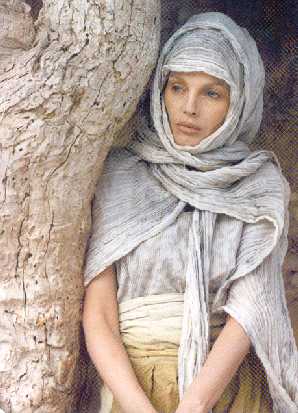

An Asian man, Bo, finds a dying white woman in a desert and brings her to his remote home, where he lives with his brother Bu. They name the woman Ba, and the three start living together. The archetypal plot—love triangle, male rivalry, jealousy, and the exchange of women, cattle, and money—eschews any unnecessary detail. The European appearance of the woman played by an Italian actress suggests the underlying theme of the film: the role of the West in the Central Asian region and the abyss separating the two worlds. А person's face covered by a cloth-mask and the subtitle "Eleven Thousand Miles from New York" also point to the identity issues this film attempts to address.
A parable about Asians Bo and Bu and the European Ba opens with a silent shot of a person listening to the sound of a remote jet. The film, in fact, has no dialogue: characters' names and music constitute most of the film's soundtrack. The film's inter-ethnic cast, which includes Kazakhs, Uigurs, Uzbeks, Kyrghizs, and Turkmens, and a pastiche of national customs, outfits, and face types, marks the film as a metaphor for post-communist Central Asia targeting the increasing nationalism of the region.
Born in 1937, Ali Khamraev graduated from the Moscow Film Institute (Grigorii Roshal's Workshop) in 1961. He is a leading Uzbek filmmaker working both in feature and documentary cinema. Khamraev is known not only for making artistically superb films, but also for making major blockbusters. His 1972 thriller The Seventh Bullet drew an audience of 22 million.
| 1998 | Bo Ba Bu |
| 1987 | The Gardens of Desire |
| 1985 | I Remember You |
| 1983 | Hot Summer in Kabul |
| 1979 | Triptych |
| 1979 | Bodyguard |
| 1979 | Man Follows Birds |
| 1972 | The Seventh Bullet |
| 1966 | White, White Storks |